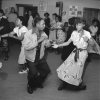Film
Hollywood's Double Take: The First Three Black Directors

Parks Shooting The Learning Tree.
In the late 1960s in a belated attempt to bring an African-American point of view to Hollywood filmmaking, the major studios hired three accomplished directors to helm Black-themed movies. While an independent Black Cinema had flourished right under Hollywood’s nose earlier in the century, and non-black filmmakers had directed African-American subjects such as Cabin In the Sky, Carmen Jones and Hallelujah!, this was the first time black filmmakers and African-American audiences could connect on a mass scale. The result was the birth of Soul Cinema. The directors were photojournalist Gordon Parks, writer/filmmaker Melvin Van Peebles and actor Ossie Davis; these three films were their first Hollywood assignments.
Tuesday 6 February at 5pm The Learning Tree
Gordon Parks, Sr. USA, 1969, 107 minutes. Based on Parks' own autobiographical novel, the film follows a young African-American boy growing up in Kansas in the days of segregation. Ravishingly shot by Parks (who had been a Life Magazine photographer) it is a sensitive and poignant coming-of-age tale that doesn’t shy away from confronting issues of race.
Tuesday 13 February at 5 pm The Watermelon Man
Melvin Van Peebles, USA, 1970, 97 minutes. Godfrey Cambridge stars in this raucous comedy about a white man who one day wakes up to find he’s become black. Using the black/white divide as a starting point, Van Peebles uses physical tomfoollery and comedy to expose suburbia as a kind of bezerk social laboratory.
Tuesday 19 February at 5 pm Cotton Comes To Harlem
Ossie Davis, USA, 1970, 97 minutes. Red Fox, Cleavon Little and Godfrey Cambridge star in this famous film version of African-American writer Chester Himes’ buddy-cop crime novel. Deftly balancing comedy, action and drama and making extraordinary use of Harlem locations, Davis made a film so popular it spawned the sequel Come Back, Charleston Blue.




